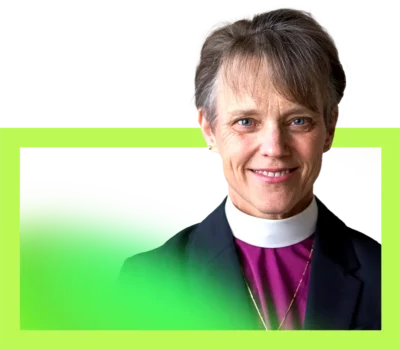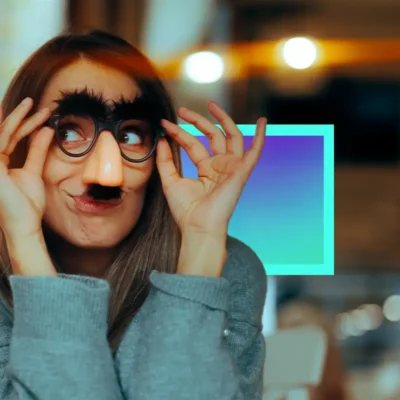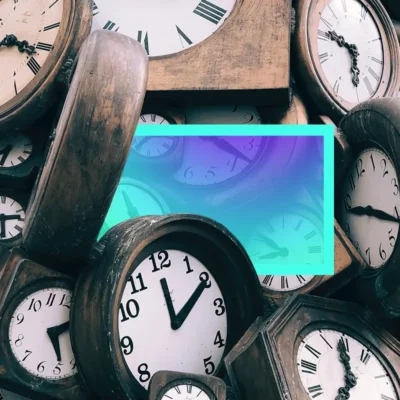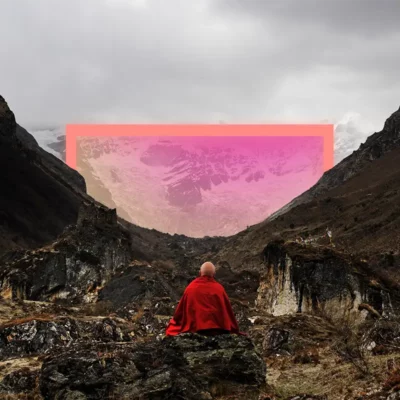It doesn’t have to be this hard
A street in Honduras. A conference room. The fifth lap of a bike ride. Crisis can descend on you in unexpected places – and so can clarity. All that’s required of you, really, is to be there for it, and to stretch yourself in ways you hadn’t expected. Mariann Budde, bishop of the Episcopal Diocese in Washington, DC, tells of three defining moments of struggle and grace in her life.
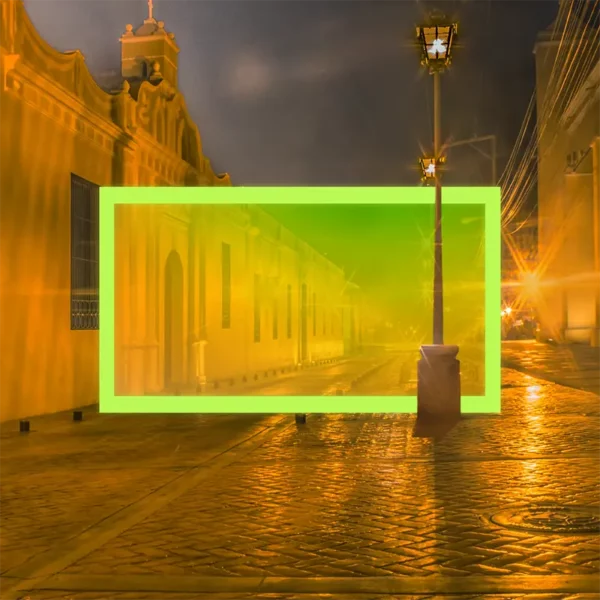
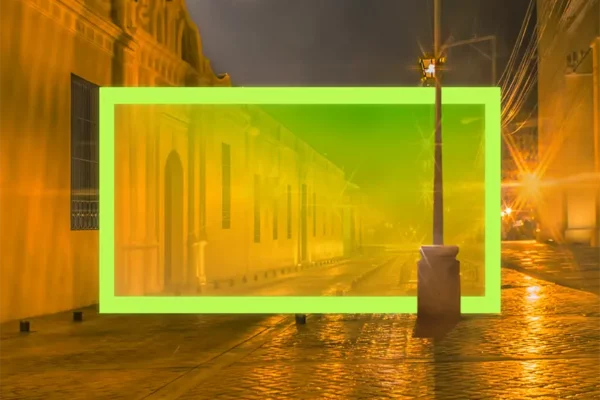
Table of Contents:
Transcript:
It doesn’t have to be this hard
BISHOP MARIANN BUDDE: There’s no dusk in Central America. It just goes from light to dark. So it’s the cusp of dark, and I need to walk. I walk and walk and walk through the urban streets. The air is dry and hot, punctuated only by the smell of burning garbage. Laundry hangs limp from the windows. Dogs are barking. My head is spinning. What am I even doing here? What can I possibly contribute in just a year? I’m disappointed, but I’m also angry because my perception of what I thought I was going to do here and what I am doing here are just completely different.
I ask myself over and over, Does it have to be so hard? Is it always going to be this hard? I’m not consciously praying. It’s more like a cry, but I can only explain what happens next as a clear answer from another realm, which has never happened to me before.
ROHAN GUNATILLAKE: Mariann Budde made headlines last year when, as the Bishop of the Episcopal Diocese in Washington, DC, she condemned the use of tear gas against peaceful demonstrators on the grounds of St John’s Episcopal Church. But finding clarity in one’s personal life isn’t always so easy, as Bishop Budde reveals in this episode. On her way to becoming the first woman to hold the city’s highest clerical post, she had to start listening to voices – voices from others, voices from within.
In this series, we combine immersive first-person stories and breathtaking music with the science-backed benefits of mindfulness practice. From WaitWhat, this is Meditative Story. I’m Rohan, and I’ll be your guide.
The body relaxed, the body breathing, your senses open, your mind open, meeting the world.
BUDDE: I have fallen in love, and one of the first things I do is concoct a ploy.
I’m in my 20s, living outside of Washington DC in a one-room apartment piled high with books, and pretty much everything else I own. I’ve lugged it all here from Tucson, where I’d spent two years working with homeless refugees from the Rust Belt and Central American refugees escaping the horrific wars in their countries. Now I’m 2,000 miles from the desert in seminary where I meet Paul, the man I will spend my life with.
Hence the ploy.
It begins when I pick up a book called Gracias, by Henri Nouwen. Nouwen put his ideas about love and suffering into practice by ministering for a year among the poor in Latin America. I feel an equally strong pull to Latin America myself, and I’ve just learned that it’s possible to do so as part of my education, to work for a year in a home for abandoned children in Honduras. But Paul isn’t as taken with this idea. After leaving his pursuit of the Roman Catholic priesthood, he’s just begun a new vocational path in aviation technology.
I’m conflicted: I don’t want to choose between my calling and my relationship. I have the sense that Paul would really like to go with me but needs more time to think. So here’s my scheme: one night I casually suggest that we read aloud to one another passages from Nouwen’s book. He agrees, smiling. “I know where this is headed,” he says. And so every evening after dinner, we read to one another. The very first passage I read him is this one:
“One of the most rewarding aspects of living in a strange land is the experience of being loved not only for what we can do, but for who we are, when we become aware that our stuttering, failing, vulnerable selves are loved even when we hardly progress…”
We read passages like that, as well as Nouwen’s incredible description of life among the poor. One night after reading, Paul looks up at me and says, “Okay, let’s go.”
We get married, and eight weeks later we board a series of planes for Honduras’ capital, Tegucigalpa. Paul volunteers in a technical high school, and I work across town at a home for younger boys. I have lofty visions of the gifts I can offer these orphaned or abandoned children. I feel a sense of responsibility to them. Their plight stems in part from the instability caused by American foreign policy in the 1980s, when Honduras was the U.S. platform for exercising its influence in the region.
My classroom is a corner of a converted lunchroom. It smells like cleaning fluid and onions. The building is basic: cement floor, cinder block walls. The kids in my fifth-grade class range in age from 10 to 17. Some are used to living on the streets. They are not interested in music lessons or anything else I have to teach. They don’t want to sit still. They are angry about the rules in this place, about the adults who come and go from their lives. They are sarcastic, they are indifferent, and they don’t trust me.
Three brothers at the home cause me particular grief: Eliel, Miqueas, and Marcos. They have come from Trujillo, which is in the Northern part of Honduras on the Caribbean coast. They are all skinny, with these wide, dark eyes. And they are hellions. The oldest, Eliel, is about 12. He is smart and rebellious and determined to make my life miserable. It’s like a caricature of a substitute teacher movie, right? I come in, I have no idea what I’m doing. Some days I am reduced to tears. Then I take these long crowded bus rides back to Paul.
All fall, I come home exhausted and bury my head in a pillow. My sweet husband’s experience is very different from mine, and this creates a challenging dissonance in our young marriage. I feel alone.
GUNATILLAKE: This is a low. Mariann may feel alone on this timeline, but we’re here in ours. She can’t see us but we see her, so let’s just be here for her. Simple. Present.
BUDDE: One afternoon Eliel and one of his classmates are throwing things back and forth. I am trying not to yell, I catch his gaze. And in it I see what looks like sheer hatred. He is looking at me and sees everything about me, everything about this moment and this place, and he just hates all of it. And in this moment, my hopes and aspirations for what I can offer or be or do in that work or in that land, come crashing down. I am completely undone.
At the end of the day, I make the long commute back across town. There’s no dusk in Central America. It just goes from light to dark. So it’s the cusp of dark, and I need to walk. I walk and walk and walk through the urban streets. The air is dry and hot, punctuated only by the smell of burning garbage. Laundry hangs limp from windows. Dogs are barking. My head is spinning. What am I even doing here? What can I possibly contribute in just a year? I’m disappointed but I’m also angry because my perception of what I thought I was going to do here and what I am doing here are just completely different.
I ask myself over and over, Does it have to be so hard? Is it always going to be this hard? I’m not consciously praying. It’s more like a cry, but I can only explain what happens next as a clear answer from another realm, which has never happened to me before. I am a person of faith, but I do not experience the divine in this way. What I hear is an unmistakably clear answer, and the answer is simply, “Yes, it is always going to be this hard.”
And I’m so surprised I burst out laughing. It certainly isn’t a message offering me any kind of solution. It’s just this realization that, “Yup, it is always going to be this hard.” And yet there is this other sense of, “but know that you’re not alone. I’m with you. You’re in the right place, just accept it. You are meant to stay right here where you are being stretched beyond your capacity. And it is not going to be easy, and it doesn’t matter. What matters is that you show up.”
And after that, something shifts. Maybe because I’m not as caught up in my ego and my worries. I feel less intimidated. And I’m better able to really focus on and listen to the kids. The boys start to trust me more. I assure them I will be here until the end of the school year. I come to love those boys, whose parents have either died or abandoned them. Paul and I even become godparents to the brothers from Trujillo.
Around the turn of the new century, I’m attending a meeting of clergy leaders. We’ve all been selected to help other clergy live more balanced and healthy lives. One night about eight of us are sitting around a fake wood table in a bland hotel conference room. No windows, those rolling chairs.
Since Honduras, I’ve become ordained. I’ve become a mom. We live in Minnesota, and I’m a senior pastor of a congregation. Now, 10 years in, I’m in a really rough patch. Work in my congregation is hard and confusing. I’m a leader in my diocese, but I’ve had a serious falling out with the local bishop, and it’s excruciating. The dean of our cathedral in Minneapolis abruptly resigns, and as soon as he does, I know that I’m going to apply to be the next dean. I want that job more than I’ve wanted anything, vocationally speaking. I’m one of three finalists. But I bomb the last interview. It’s just the worst interview of my life. I even think as I’m talking, this is going really badly. On some level I know I’m not ready for the magnitude of responsibility and political complexity of that system. Needless to say, I’m not selected as the next dean.
Later that night, we take our two boys to see The Lord of the Rings. There’s Frodo and Gandalf on the screen having their adventure. My boys are totally captivated, but I can’t focus on anything. I can only think about how I blew it. I feel it physically in my head, this weight on my head and in my heart, this physical pain.
That night in the conference room, I learn that a couple of my colleagues have faced similar disappointments recently. I share my story of humiliation and rejection, and then I share my memory from Honduras, as a feeble attempt to put a positive spin on things.
There was the voice reminding me that life is always going to be hard. As if it is my answer again, yes, life is going to be this hard. Accept it.
The next morning, I’m standing in line to check out of the hotel. One of my colleagues rolls her bag over to me and gently touches my elbow, pulls me aside. She bends her head to mine and peers at me through her plastic-rimmed glasses and says, “You know Mariann, I heard your story last night,” she says. “I heard your pain. And I just want you to know that it doesn’t always have to be this hard. I think you need help. I think you need to ask for help.”
The truth of her words hit me hard, but I can’t believe them – like, how does it not be hard? And she says, “Let me help you.” That conversation starts a whole journey of healing, going into therapy, dealing with my pain, and actually getting support. I realize that God, or the universe, or whatever divine belief you may have doesn’t just show up to help you get through hardship. Sometimes it comes to lighten the load and to give more grace, to give freedom.
GUNATILLAKE: Lighten the load. Grace. Freedom. Let those words do their work. Softening the body. Softening any tension that is here. Dropping that which we are holding but don’t need to.
BUDDE: Inspired to be more open in my conversations, I have another talk with a friend who tells me about his experience with medication for depression. I listen as he describes all that he is no longer carrying around. And I think, I had no idea that that was possible. That it could be different inside my head. I gather up my nerve and talk to a doctor who says, “Yes, this could really help you. Medication is not going to turn you into a new person. You’re still going to be who you are, but you don’t have to carry a weight with you all the time.”
This is part of my healing process, learning that I can ask for help. And I do. From friends, from colleagues, doctors, my therapist, from Paul.
I learn that hardship isn’t the only path to enlightenment. The goodness of humanity can get you there. The wonders of nature, the miracles of medicine. There are multiple avenues to joy in the world – the trick for me is to be open to that joy, or to moments of that joy, even when we are doing very hard things and living in dark times.
It’s a muggy day in August in Minneapolis. I’m riding my blue road bike around the city’s chain of lakes. Three of them sit near my house, making a loop of about 10 miles. I’m training for a century ride, so today is a 60-mile ride. I need to train, but I also need to think for the four hours or so that it will take. I need to make some really big decisions.
Although I’m here a lot on weekends and vacations, I now live most of the time in Washington, DC where, 10 years after that conference, I become the Bishop of the Episcopal diocese. I love the nuances and challenges of the job. I love that my office is on the grounds of Washington National Cathedral where I can walk out into the Bishop’s Garden and marvel at the spring blossoms. But once again, I feel the conflict of my vocation versus my marriage. Back in seminary, I talked Paul into coming to Honduras with me. But now Paul isn’t ready to leave his job in Minnesota, so we commute back and forth. Our boys are grown. I feel badly, because I know I’m not fully showing up in my marriage. I seriously wonder if we should separate.
It’s a busy day at the lakes. Families with young children play on the beaches. Brightly attired joggers and walkers use the path parallel to the bike lane. Big green trees line the paths. I ride lap after lap. At the halfway point, I stop to eat a banana I’ve tucked into the back of my jersey. I drink a lot of water, and I keep going. What I’m waiting for is another message – clarity on what to do, like the message that hit me on the street all those years ago in Tegucigalpa.
I’m on my fifth lap when the tears come. They are tears of gratitude. Because there is no answer, and that to me, in its own strange way, is a clear message. I’m not going to break up this marriage without absolute clarity. And there is no clarity. I sit on a bench at the edge of the lake, and it is like the universe says to me, “You have your answer. You have your answer.” It’s a truth that settles into me. Our problems don’t disappear, but the weight of the decision has lifted. I feel lighter and better able to be present, to listen.
These days, when I’m able to catch a brief stroll among the flowers and stones of the Bishop’s Garden, I think a lot about how we experience a connection to a higher self – what in my faith we’d call the presence of God. For me, it’s in those times when I am most vulnerable and honest with myself – walking in that neighborhood in Tegucigalpa, certainly in that conference room, and then on the bike – having the sense that I can really use some wisdom and some goodness right now.
When it comes, it is such a gift. It doesn’t come often, but I can go for years on a moment like that, a moment that settles a struggle. Even if the conditions of the struggle don’t change, I’m settled in it, and I can go on. And it turns out you can find yourself in what’s easy, not just in what’s hard. I’m learning to savor rest and renewal and joy when the doors open for us. Sometimes it has to be hard, yes, but those doors of joy may open for a moment. And when they do, how miraculous it is to be ready.
Rohan’s closing meditation
GUNATILLAKE: There’s so much wisdom in Mariann’s story. I guess that’s not a big surprise. So what we’re going to do for our closing practice together is to echo three of the big insights she shares. And we’ll start where she does.
Invite your body to be comfortable, whatever position it might be in right now. And even with that kind invitation, there will be areas of tightness or unpleasant sensation.
Can you locate one? For me, yep, it’s in the shoulders – hello, old friend. And aware of this sensation, can our relationship to it be one of allowing?
Knowing where there is tension right now and resting with it. Aware of the difficult, but allowing it to be here.
For a lot of people this is what they think mindfulness is. Accepting suffering. Bearing the difficult. Knowing it and showing up. It’s a very traditional idea. But the promise of mindfulness is not acceptance; it’s transformation.
So let’s move to Mariann’s second insight.
It’s a kind of alchemy. Turning our heavy dull lead into that which glitters. For Mariann it is about finding what works. And part of that is tuning more into joy, being open to receiving it, even in the middle of the difficult.
You’re here because you know this show helps in its little way. That means you have your own wisdom, you know what you need and how to make time for it. Appreciate that.
You might not think that you’re wise but trust me, you are. Allow any warmth or joy or smile or softness to be here. Receive it.
Hardship isn’t the only path to enlightenment. It may be the most traditional one but it isn’t the only one. There is also joy.
What if the process was as fun as the result? Because our minds can default to the negative it can take work, take energy to lift it up to rest with the lovely path.
But it is possible. So let’s notice any pleasantness that is here, anything that is lovely. And if nothing is obvious, notice the absence of pain. No toothache. No anguish. Just this calm coolness. That is pleasant too when we can tune into it.
And finally let’s just listen. Listen to any messages that might arise in the mind.
We can make a big deal about them if that would help. Or just know them as the noise of the mind, fragments of consciousness coalescing and being ascribed meaning.
Thank you Mariann. And thank you.
You know the team here at Meditative Story work hard, I’ve never been involved in such a passionate production, and knowing that so many of you get to this point with such full hearts means so much to us.
Thank you.

